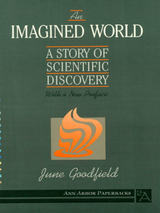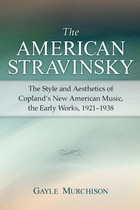
One of the country's most enduringly successful composers, Aaron Copland created a distinctively American style and aesthetic in works for a diversity of genres and mediums, including ballet, opera, and film. Also active as a critic, mentor, advocate, and concert organizer, he played a decisive role in the growth of serious music in the Americas in the twentieth century.
In The American Stravinsky, Gayle Murchison closely analyzes selected works to discern the specific compositional techniques Copland used, and to understand the degree to which they derived from European models, particularly the influence of Igor Stravinsky. Murchison examines how Copland both Americanized these models and made them his own, thereby finding his own compositional voice. Murchison also discusses Copland's aesthetics of music and his ideas about its purpose and social function.
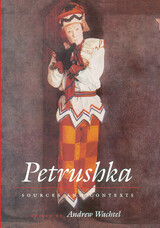
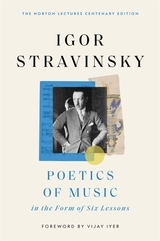
Timeless lessons on the pleasures of listening, the dilemmas of composition, and the meaning of artistic freedom from a founder of musical modernism.
In October 1939, Igor Stravinsky took the stage at Harvard not as a conductor but as a speaker. Invited to deliver the prestigious Norton Lectures, he had departed Europe just days after the outbreak of war, leaving behind not only a growing political maelstrom but also his life in France, where his wife, eldest daughter, and mother all had died in the previous year.
Poetics of Music offers a snapshot of this pivotal moment in the composer’s biography and career. Delivered at the height of his neoclassical period, which blended the sculptural precision of classicism with distinctively twentieth-century cadences, Stravinsky’s lectures explore both the creative potential and the constraints of tradition. Though he achieved artistic immortality as a genre-defying experimentalist who scandalized audiences in Belle Époque Paris, the Stravinsky we find here is more circumspect, defending the dignity of formal conventions against the more anarchic currents of modernist experimentation. Tradition, he argues, is not a relic of a bygone past but a living force that animates the present. And true artistic freedom emerges not only in moments of revolutionary inspiration but also through strict deference to the formal requirements of the work.
Like his compositions, Stravinsky’s lectures are ambitious and at times bombastic, punctuated by wit and polemic. Ranging widely from the phenomenology of rhythm to the fate of high culture in the Soviet Union, he invites us to reflect on what it is in music that compels us, whether we are hearing one of his polytonal works or a simple birdsong.
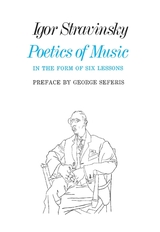

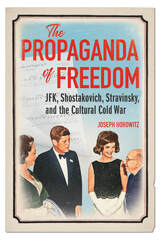
Eloquently extolled by President John F. Kennedy, the idea that only artists in free societies can produce great art became a bedrock assumption of the Cold War. That this conviction defied centuries of historical evidence--to say nothing of achievements within the Soviet Union--failed to impact impregnable cultural Cold War doctrine.
Joseph Horowitz writes: “That so many fine minds could have cheapened freedom by over-praising it, turning it into a reductionist propaganda mantra, is one measure of the intellectual cost of the Cold War.” He shows how the efforts of the CIA-funded Congress for Cultural Freedom were distorted by an anti-totalitarian “psychology of exile” traceable to its secretary general, the displaced Russian aristocrat/composer Nicolas Nabokov, and to Nabokov’s hero Igor Stravinsky.
In counterpoint, Horowitz investigates personal, social, and political factors that actually shape the creative act. He here focuses on Stravinsky, who in Los Angeles experienced a “freedom not to matter,” and Dmitri Shostakovich, who was both victim and beneficiary of Soviet cultural policies. He also takes a fresh look at cultural exchange and explores paradoxical similarities and differences framing the popularization of classical music in the Soviet Union and the United States. In closing, he assesses the Kennedy administration’s arts advocacy initiatives and their pertinence to today’s fraught American national identity.
Challenging long-entrenched myths, The Propaganda of Freedom newly explores the tangled relationship between the ideology of freedom and ideals of cultural achievement.
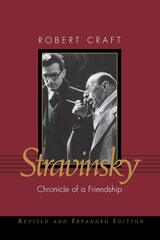
For nearly the last twenty-five years of Igor Stravinsky's incredibly full life, the noted musician, conductor, and writer Robert Craft was his closest colleague and friend, a trusted member of his household, and an important part of all of the composer's activities. Throughout these years, Craft kept a detailed diary, impressive in its powers of observation and characterization. That diary forms the basis for Stravinsky: Chronicle of a Friendship, now released in a substantially revised and expanded new edition.
This edition includes nearly twice as many illustrations and more than 35% entirely new textual material. In addition, Craft adds an evocative "Postlude" in which he summarily brings matters forward to the death of Vera Stravinsky, several years after that of the Maestro.
READERS
Browse our collection.
PUBLISHERS
See BiblioVault's publisher services.
STUDENT SERVICES
Files for college accessibility offices.
UChicago Accessibility Resources
home | accessibility | search | about | contact us
BiblioVault ® 2001 - 2025
The University of Chicago Press






